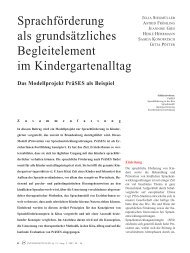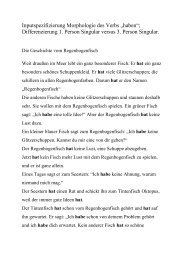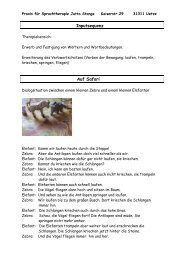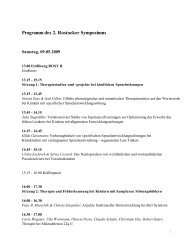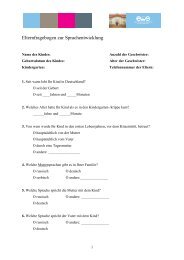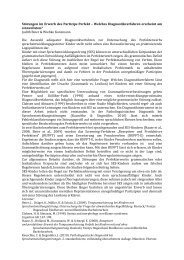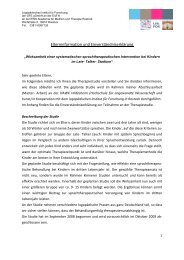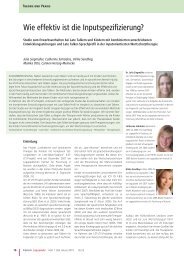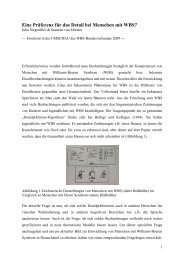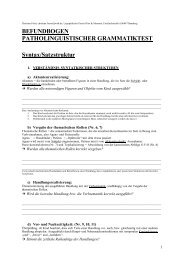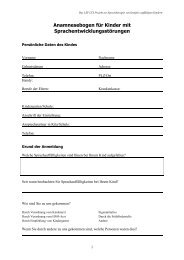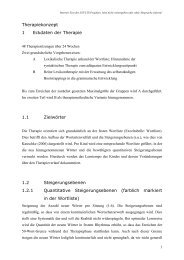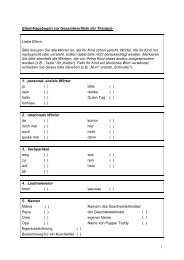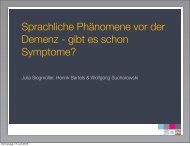mutual exclusivity constraint - Opus - KOBV
mutual exclusivity constraint - Opus - KOBV
mutual exclusivity constraint - Opus - KOBV
Sie wollen auch ein ePaper? Erhöhen Sie die Reichweite Ihrer Titel.
YUMPU macht aus Druck-PDFs automatisch weboptimierte ePaper, die Google liebt.
Landau, B., Hoffman, J. E., Reiss, J. E., Dilks, D. D., Lakusta, L., & Chunyo, G. 2006. Specialization,<br />
breakdown, and sparing in spatial cognition: lessons from Williams-Beuren syndrome. In<br />
Morris, C. A., Lenhoff, H. M., & Wang, P. P. (Eds.), Williams-Beuren Syndrome - Research,<br />
evaluation, and treatment. Baltimore, The John Hopkins University Press: 207-236.<br />
Landau, B. & Shipley, E. F. 2001. Labelling patterns and object naming. Developmental Science, 4:<br />
109-118.<br />
Landau, B., Smith, L. B., & Jones, S. S. 1988. The importance of shape in early lexical learning.<br />
Cognitive Development, 3: 299-321.<br />
Landau, B. & Zukowski, A. 2003. Objects, motions, and paths: spatial language in children with<br />
Williams syndrome. Developmental Neuropsychology, 23: 105-137.<br />
Lenhoff, H. M., Wang, P. P., Greenberg, F., & Bellugi, U. 1998. Williams-Beuren-Syndrom und<br />
Hirnfunktionen. Spektrum der Wissenschaft, : 62-68.<br />
Leonard, L. B. 1998. Children with specific language impairment. Cambridge: MIT Press.<br />
Leonard, L. B. 2003. Specific language impairment: characterizing the deficit. In Levy, Y. &<br />
Schaeffer, J. (Eds.), Language competence across populations: towards a definition of Specific<br />
Language Impairment. Hillsdale, Lawrence Erlbaum Ass.: 209-233.<br />
Levy, Y. 1996. Modularity of language reconsidered. Brain & Language, 55: 240-263.<br />
Levy, Y. & Bechar, T. 2003. Cognitive, lexical and morpho-syntactic profiles of Israeli children with<br />
Williams syndrome. Cortex, 39: 255-271.<br />
Levy, Y. 2004a. A longitudinal study of language development in two children with Williams<br />
syndrome. Journal of Child Language 31: 287-310.<br />
Levy, Y. 2004b. Emergent linguistic competence in children with Williams syndrome. In: Bartke, S. &<br />
Siegmüller, J. (Eds.), Williams syndrome across languages. Amsterdam, Benjamins: 271-293.<br />
Liittschwager, J. C. & Markman, E. 1994. Sixteen- and 24-month-olds´ use if Mutual Exclusivity as a<br />
default assumption in second-label learning. Developmental Psychology, 30: 955-968.<br />
Losh, M., Bellugi, U., Reilly, J., & Anderson, D. 2000. Narrative as a social engagement tool: the<br />
excessive use of evaluation in narratives from children with Williams syndrome. Narrative<br />
Inquiry, 10: 265-290.<br />
Lukàcs, A. 2005. Language abilities in Williams syndrome. Budapest: Akadémiai Kiadó, Wolters<br />
Kluwer Group.<br />
Mac Donald, G. W. & Roy, D. L. 1988. Williams syndrome: a neuropsychological profile. Journal of<br />
clinical and experimental Neuropsychology, 10: 125-131.<br />
Majerus, S. 2004. Phonological processing and verbal short-term memory in Williams syndrome. In<br />
Bartke, S. & Siegmüller, J. (Eds.), Williams syndrome across languages. Amsterdam,<br />
Benjamins: 125-142.<br />
Majerus, S., Barisnikov, K., Vuillemin, I., Poncelet, M., & Van den Linden, M. 2003. An investigation<br />
of verbal short-term memory and phonological processing in four children with Williams<br />
syndrome. Neurocase, 9: 390-401.<br />
Marazita, J. M. & Merriman, W. E. 2004. Young children´s judgment of whether they know names for<br />
objects: the metalinguistic ability it reflects and the processes it involves. Journal of Memory<br />
and Language, 51: 458-472.<br />
Markman, E. 1989. Categorization and naming in children. Cambridge MA: MIT Press.<br />
Markman, E. 1990. Constraints children place on word meanings. Cognitive Science, 14: 57-77.<br />
Markman, E. 1992. Constraints on word learning: speculations about their nature, origins, and domain<br />
specificity. In Gunnar, M. & Metatsos, M. (Eds.), Modularity and <strong>constraint</strong>s in language and<br />
cognition. Hillsdale, Lawrence Erlbaum Ass.: 59-103.<br />
Markman, E. 1993. Constraints children place on word meanings. In: Bloom, P. (Ed.), Language<br />
acquisition. New York, Core Readings: 154-179.<br />
Markman, E. 1994. Constraints on word meaning in early language acquisition. In Gleitman, L. R. &<br />
Landau, B. (Eds.), The acquisition of the lexicon. Cambridge, MIT Press (Lingua 92): 199-227.<br />
Markman, E. 1998. Early use of word learning <strong>constraint</strong>s. Annual Report of Educational Psychology<br />
in Japan, 37: 21-26.<br />
Markman, E. & Hutchinson, J. E. 1984. Children´s sensitivity to <strong>constraint</strong>s on word meaning:<br />
taxonomic versus thematic relations. Cognitive Psychology, 18: 1-27.<br />
Markman, E. & Wachtel, G. 1988. Children´s use of <strong>mutual</strong> <strong>exclusivity</strong> to constrain the meaning of<br />
words. Cognitive Psychology, 20: 121-157.<br />
Markman, E., Wasow, J. L., & Hansen, M. B. 2003. Use of the <strong>mutual</strong> <strong>exclusivity</strong> assumption by<br />
young word learners. Cognitive Psychology, 47: 241-275.<br />
155



